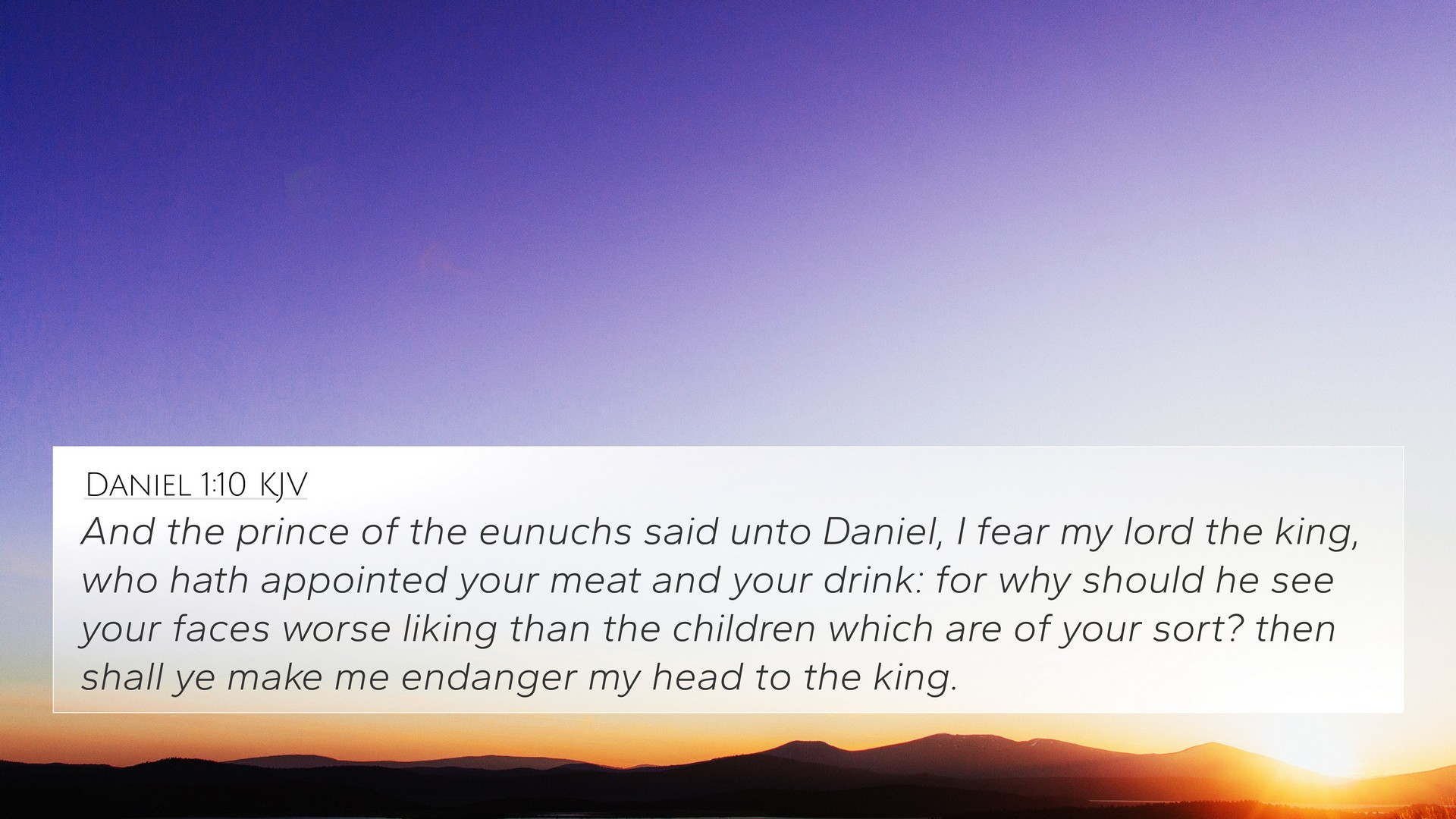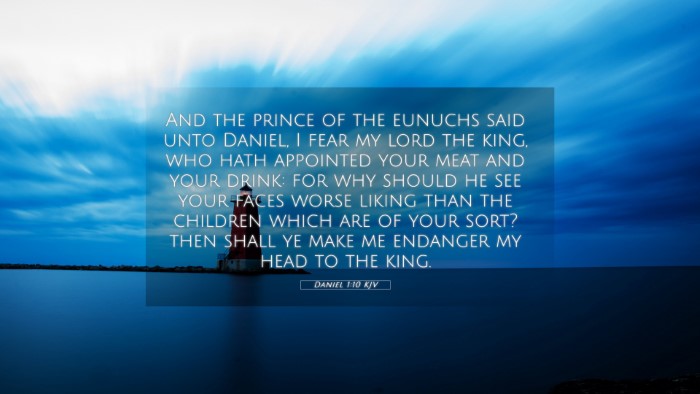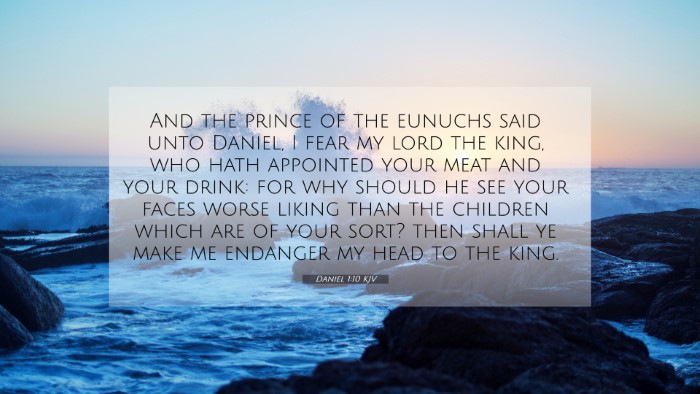Old Testament
Genesis Exodus Leviticus Numbers Deuteronomy Joshua Judges Ruth 1 Samuel 2 Samuel 1 Kings 2 Kings 1 Chronicles 2 Chronicles Ezra Nehemiah Esther Job Psalms Proverbs Ecclesiastes Song of Solomon Isaiah Jeremiah Lamentations Ezekiel Daniel Hosea Joel Amos Obadiah Jonah Micah Nahum Habakkuk Zephaniah Haggai Zechariah MalachiDaniel 1:10 Similar Verses
Daniel 1:10 Cross References
And the prince of the eunuchs said unto Daniel, I fear my lord the king, who hath appointed your meat and your drink: for why should he see your faces worse liking than the children which are of your sort? then shall ye make me endanger my head to the king.
Uncover the Rich Themes and Topics of This Bible Verse
Listed below are the Bible themes associated with Daniel 1:10. We invite you to explore each theme to gain deeper insights into the Scriptures.
Daniel 1:10 Cross Reference Verses
This section features a detailed cross-reference designed to enrich your understanding of the Scriptures. Below, you will find carefully selected verses that echo the themes and teachings related to Daniel 1:10 KJV. Click on any image to explore detailed analyses of related Bible verses and uncover deeper theological insights.
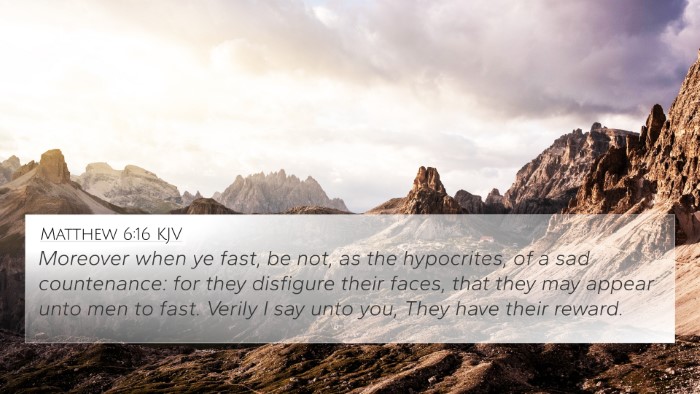
Matthew 6:16 (KJV) »
Moreover when ye fast, be not, as the hypocrites, of a sad countenance: for they disfigure their faces, that they may appear unto men to fast. Verily I say unto you, They have their reward.
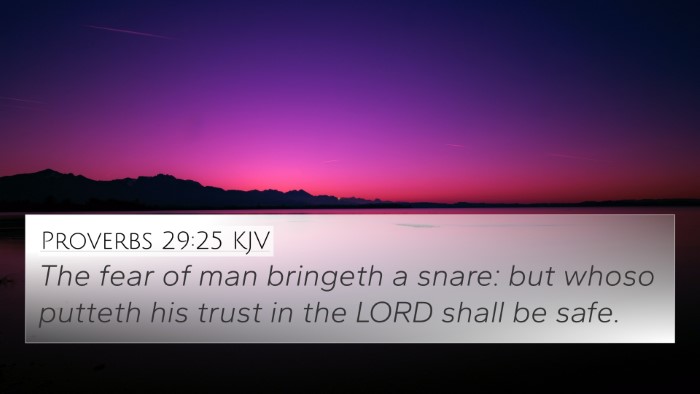
Proverbs 29:25 (KJV) »
The fear of man bringeth a snare: but whoso putteth his trust in the LORD shall be safe.
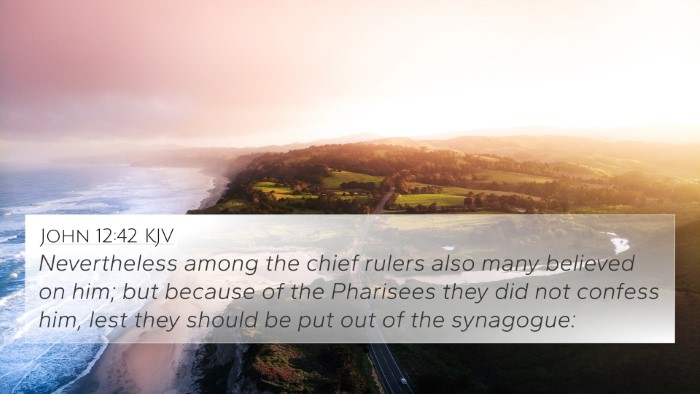
John 12:42 (KJV) »
Nevertheless among the chief rulers also many believed on him; but because of the Pharisees they did not confess him, lest they should be put out of the synagogue:
Daniel 1:10 Verse Analysis and Similar Verses
Understanding Daniel 1:10: A Comprehensive Analysis
Daniel 1:10 states, "And the chief of the eunuchs said to Daniel, 'I fear my lord the king, who has appointed your food and your drink; for why should he see that you were worse in condition than the youths who are of your own age? So you would endanger my head with the king.'" This verse encapsulates a critical moment in the life of Daniel and his friends as they navigate their faith amidst the challenges of living in Babylon.
Summary of the Verse
In this verse, the chief of the eunuchs expresses his concern for Daniel after Daniel requests to abstain from the royal food and wine. The eunuch fears for his own safety, worried that the king might punish him if Daniel appears less healthy than his peers. This confrontation illustrates the tension between faithfulness to God and the earthly powers that demand compromise.
Commentary Insights
Matthew Henry's Commentary emphasizes the significance of Daniel's conviction to maintain his dietary laws, noting how it serves as a powerful testimony of faith in God against the backdrop of a pagan culture. Daniel's courteous approach in requesting a different diet is highlighted, indicating both respect for authority and a firm resolution to adhere to God's standards.
Albert Barnes' Commentary focuses on the implications of the eunuch's statement of fear. It suggests that the chief of the eunuchs felt a strong obligation to obey the king, showing the delicate balance between loyalty to the king and the recognition of Daniel's determination to remain faithful to his beliefs. This commentary elucidates the human element in the face of divine purpose.
Adam Clarke's Commentary adds depth by analyzing the reasons behind the dietary laws, connecting it to broader themes of holiness and the necessity for believers to hold their ground in faith, even when faced with potential consequences. Clarke also suggests that the fear of the eunuch illustrates a common human instinct to prioritize personal safety over the welfare of others, a theme that resonates throughout scripture.
Bible Verse Cross-References
Daniel 1:10 can be cross-referenced with various other scripture passages that provide additional context and thematic connections:
- Leviticus 11: Discusses the dietary laws that Daniel seeks to adhere to.
- 1 Peter 2:9: Highlights the idea of being a chosen people, emphasizing a different identity that believers must maintain.
- Matthew 10:28: Assures believers not to fear those who can harm the body but cannot affect the soul, paralleling Daniel's situation.
- Romans 12:2: Encourages believers not to conform to the patterns of this world, similar to Daniel's refusal of royal provisions.
- Acts 5:29: "We must obey God rather than human beings," reinforcing the principle of divine allegiance over earthly authority.
- Hebrews 11:33-34: Details how others through faith were able to endure trials and remain steadfast, echoing Daniel's faithfulness.
- Proverbs 29:25: States that "the fear of man lays a snare," emphasizing the potential pitfalls of prioritizing human fear over faith.
- Psalms 119:37: "Turn away my eyes from looking at worthless things," which resonates with Daniel’s focus on maintaining spiritual integrity.
- James 1:12: Discusses the blessings associated with enduring trials, akin to Daniel's stand amidst adversity.
Thematic Connections
This passage not only highlights the courage of Daniel but also opens discussions about faith, obedience, and the consequences of standing firm in beliefs. The relationship between faith and authority is intricately woven through this narrative, prompting readers to explore how these themes appear throughout the Bible.
Comparing Other Biblical Texts
When analyzing Daniel 1:10, the connections between this passage and others like Exodus 20:3-5 can be observed, illustrating the call to put God first above all earthly powers. Further comparisons can be drawn with Jesus’ interactions with authority in the Gospels, particularly in how He navigated His mission despite the potential for earthly repercussions.
Practical Application
For believers today, Daniel 1:10 serves as a poignant reminder of the importance of standing firm in one's convictions. It encourages the exploration of personal faith in the context of modern challenges, promoting the idea that true faith can lead to divine favor amidst worldly opposition.
Tools for Bible Cross-Referencing
For those seeking to delve deeper into cross-referencing Biblical texts, several resources and tools are available:
- Bible concordance for looking up specific themes or words.
- Cross-reference Bible guides that facilitate comparative studies.
- Online databases and apps that allow quick identification of related verses.
- Study Bibles which often contain extensive cross-references in the margins.
Conclusion
The exploration of Daniel 1:10 reveals essential insights into the character of faith as demonstrated by Daniel, enhancing our understanding of the broader Biblical narrative. By engaging in connections between this and other scriptures, believers are encouraged to bring their faith into the public sphere with confidence and grace.
